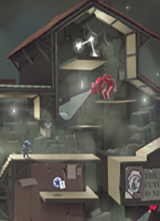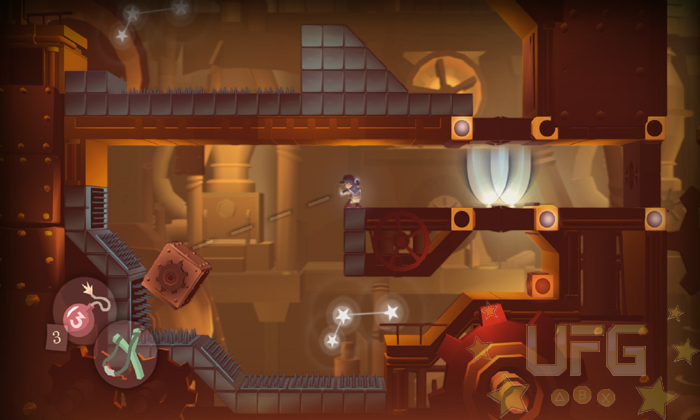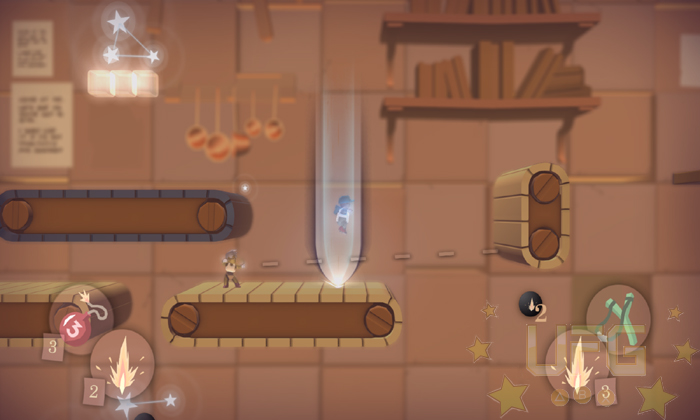Pid
One of the things that I make sure to never do on a long bus ride is falling asleep. The last thing I want to do is wake up to the sound of the bus driver saying “this is my last stop” in a foreign place. Pid, developed by Might and Delight, takes that simple fear of being lost and intensifies it a thousand fold. Not only did the main character of their game get lost; he ended up on another planet!
Kurt, our protagonist, has fallen asleep during his bus ride home. Upon waking, he finds himself on a strange planet where robots of all sizes reside. Some of them have been stranded on the planet like Kurt while others are there to make sure everyone stays stranded. Large portions of the planet are made up of what would typically be considered normal structures. Instead of there being a mountain or another natural landmark, Kurt traverses a giant attic found in an enormous house. Instead of discovering a city where the robots live, Kurt finds a single castle, erected from the planet itself. Finding a way home is definitely going to take some doing.
Over the course of the game, gamers will need to platform their way through these odd locations, battle interesting bosses, and solve tough puzzles in order to get home. For the most part, all of the levels are expertly designed. They invoke nostalgic memories of playing classing platformers while also offering something new in the way of puzzles. Kurt uses cones of magic light to push/propel him up and forward (depending on how they are positioned). Two of them can be thrown almost anywhere within a level, allowing Kurt to reach places otherwise unattainable, to avoid pitfalls, or to push items around the environment. Gamers will need to think before making each leap, not only when it comes to getting over spiked pits and onto moving platforms but also when it comes to solving puzzles and defeating enemies. Due to the fact that Kurt can die from just one touch by an enemy, their placement within each level isn’t random. They are there to add just the right amount of difficulty to give gamers a challenge.
Speaking of challenge, Pid’s bosses are very challenging. In a fair way though; despite numerous failed attempts I never found the bosses to be cheap. What makes them tough is the creative design and pattern of the combat necessary to defeat them. They are like giant puzzles to be figured out. Once you figure them out, the challenge then turns to dealing with them using the skills you’ve learned so far. For instance, one boss needed to be hit with his own bombs before he’d show his weakness. From there, gamers would need to use a magic item (similar to the cones of light) and springy platforms to get up to the place where he can be attacked. This of course has to be done while he is stunned, which only lasts a few seconds. It sound’s simple, but he can be rather tricky to take down.
Pid is the most fun when you are exploring Kurt’s surroundings, collecting stars (the game’s currency), and solving intricate puzzles. Speaking of collecting things, there is a lot to collect in Pid. The stars are used to purchase items to make things easier for Kurt. For example, buying bombs allows Kurt to kill enemies (something he can’t do in most cases) instead of trying to avoid them. Buying a vest will give Kurt more hits before dying. There are a lot of items that can change how you approach a problem, some of which are needed for later puzzles. Outside of those things, there are hidden items that reveal a little more about the story. While they don’t grant gamers any hidden messages, they do allow for a better understanding of what’s going on. For instance, finding an old bus ticket… this paints a pretty grim picture; no one has escaped the planet Kurt is currently on.
Adding to the fun is the game’s great soundtrack. Doing all of these things with jazzy tunes playing in the background, helps to establish this title’s overall since of wonder and charm. If that wasn’t enough, the game’s visuals take it over the top. The world is filled with “pastel” like colors, bright and vibrant yet subtle in its use. Everything has a softness to it that makes it stand out amongst other titles. Based on the music and visuals alone, this robotic world is worth visiting.
Might and Delight did a great job creating a mostly, well rounded platformer. Unfortunately there are some rough edges when it comes to gameplay. A certain points in the game the difficulty level peaks unexpectedly, often leading to major frustration. The game will throw a lot at you, requiring reflexes and skills that earlier parts of the game failed to establish due to the lack of similar challenges. Yes, you were informed on the basics, but never in ways that would get you out of some of these predicaments. A gradual increase in difficulty coupled with a clear introduction to new mechanics would have allowed the player to become adequately acclimated to the puzzle-oriented, platforming gameplay. Trying to outrun a quick-moving giant robot while maneuvering through a maze-like environment filled with spikes and enemies can be quite daunting at first. It becomes discouraging after the twentieth failed attempt.
To be fair, you are given everything you need to survive. Not once were there was a time when I felt like the game was asking for the impossible. Still, it’s not like the game was advertised as a really tough title from the start; I can see these peaks in difficulty being enough to keep some gamers from finishing the game (even with the help of a second player). Not because they can’t complete it, but because they may lose interest after dealing with some of the tougher sections of the game. Especially when they realize that Pid isn’t a short game and that worse scenarios may be around the corner. Which is a shame because Pid can be very fun to play!
Gameplay:
8
Pid has well designed levels, intricate platforming puzzles, and clever bosses. However, the discontinuous difficulty may keep gamers from experiencing all this game has to offer.
Graphics:
10
I’m a big fan of the stylized graphics.
Sound:
10
The music is great!
What's New:
8
The puzzle/platforming elements go a long way to make this game stand out. Also, it has some of the best bosses in this genre.
Replay Value:
5
There are a lot of hidden items and collectables in the game which would most likely warrant another play through. That said, one would need to be motivated enough to get through the tough parts of the game.
Final Score:
8.2



